Just before she falls asleep, Olivia Colman often has the same fantasy. “There’s a phrase in French,” she says, “which is that as you’re going into your slumber, you become your most eloquent. I don’t know what it is, but I love that they have a word for it. Anyway, I have these incredible dreams about seeing a bully. Nowadays I think I could go: ‘Don’t fucking do that!’ But as a younger person, I couldn’t. So in my dream, I stand up and I do a speech and go: ‘Fuck you!’ And the people go, ‘Oh! I’m so sorry for my behaviour!’”
She shivers with pleasure. From the next chair, a great thunderclap of cackles courtesy of Micheal Ward, her co-star in Empire of Light. Colman clarifies: “I’ve never done that, given a speech like that. But to watch someone with no inhibitions, unleashed to say what they want to say … goosebumps!”
Empire of Light gives Colman ample chance to give it both barrels. She plays Hilary, a cinema manager with bipolar disorder in Margate in 1981. Hilary returns from another hospital stay numb on lithium, dead-eyed whether doling out the Opal Fruits or another dusty handjob for her boss (Colin Firth).
Then Stephen (Ward), a young Black man, is hired as a ticket-seller. They begin a fling. Hilary stops the pills, starts dancing, gets into two-tone. All is peachy. Until it’s not.
The first crack appears on a date at the beach. Hilary abruptly destroys a sandcastle while ranting about patriarchal oppression. “She’s breaking free of the shackles!” says Colman, all empathy and delight. “Kicking down the neat and regular!”
Ward demurs. “I just sort of thought: ‘Why you going so crazy? Yo, we’re making this fucking sandcastle! It’s in proportion! Why you breaking it up?’ Stuff like that really annoys me. ‘We’ve made this thing. It’s …’”
“Perfect!” says Colman. “Beautiful!”
“And she’s literally just ruining it!”
“She’s breaking the walls down! Literally!”
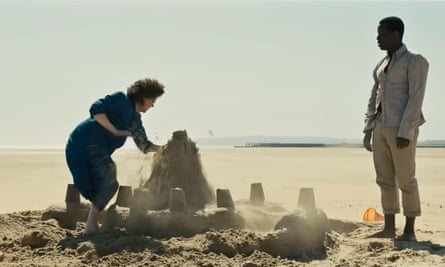
On screen, Hilary and Stephen’s affair is soulful stuff. Poetry volumes are given as gifts. Trysts conducted in front of the view immortalised by Turner. In the flesh, their dynamic is more domestic – maternal, even.
Ward, 25, best known for his work on the television drama Top Boy, rattles away garrulously about how the old folk (“in their 60s or 70s”) at his Chigwell gym told him about Black skinheads in the early 80s, who Colman, 48, gently suggests were probably just into ska rather than actual fascists. “Yeah,” says Ward. “A lot of older people just love to talk about when they were younger.”
“I know that feeling,” she says companionably. Three years on from her Oscar win, Colman is as unassuming as ever; nicely described by the film’s writer and director, Sam Mendes, as a Ferrari disguised as a Mini. They had never met before he asked her, over Zoom, to play a character heavily based on his mother, Valerie.
“I had Sam every day to hold my hand and describe how she felt,” says Colman. “But there’s always you, too. If you’re playing someone angry, you find the bits of you that are angry. That’s, y’know, the job.”
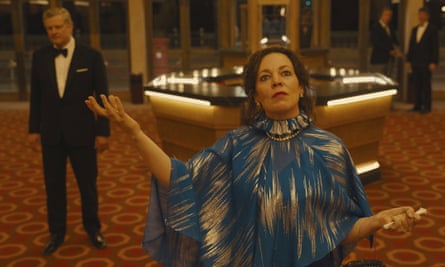
She took a lot from The Secret Life of the Manic Depressive, Stephen Fry’s 2006 documentary, in which he asked bipolar people if they would choose not to have the condition if they could. “They all said no,” says Colman. “The highs are too great. The feeling of power. They all felt so liberated at the top of the psychotic episode.
“I kept thinking about that. About just wanting to feel something again. Then you start to feel amazing. And then you’ve got the fall. And the comedown is horrendous.”
Valerie, 83, has seen the film and liked it, reports her son. Empire of Light is a mainstream Oscar contender that can easily wrongfoot you, not least for its suggestion that untrammelled truth-telling born from mental illness should be celebrated, as well as, if necessary, curbed.
“Even as a child,” says Mendes, “I could see that my mother, when she was medicated or controlled, was being manipulated, mostly by men. Coming off the medication allowed her finally to tell them the truth. I did feel that was heroic. There was something extraordinary when she turned on them. And magnificent. Her full self was expressed.”
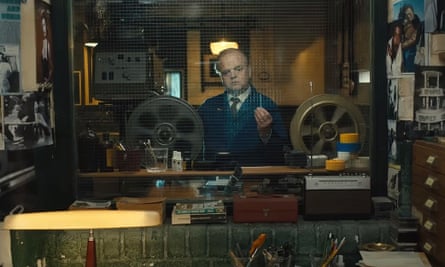
Mendes was three when his parents divorced, leaving Valerie “a single mother trying to bring up a little boy, a stroppy ball of ego and need, and trying to make a living in a very male-dominated environment”.
When he was 11, they moved from London to Oxford, where Sam started mixing in the same crowd as Toby Jones, who plays the cinema projectionist in Empire of Light. “Sam radiates this sort of tremendous self-assurance,” says Jones with a crinkled smile. “And he was like that as a boy.”
The film made Jones rethink that bravado. “You are very aware the film is informed by autobiography, and alert to the sensitivities of that. There’s a fragility in certain scenes that you have to honour.”
“When you’re a child,” says Mendes, “you deal with what’s in front of you. And what doesn’t kill you makes you stronger. It definitely gave me resources, but it also turned me into a caretaker. In a sense I was parenting my own mother.”
That meant watching her “like a hawk. Every little shift: a change of scent, of clothing, of hair, of makeup can mean huge things. So I grew up very quickly and I also moved into a job where I could create an environment, which in opposition to my life was completely controllable.”
Jones also loves the liberation of everything being scripted. “When you go to the cinema, you want to be in a world that ultimately makes a kind of sense. Because the bits we struggle to deal with have been edited out.”
Yet unlike superficially similar recent films – Roma, Belfast, The Fabelmans – Mendes didn’t put himself in the picture; Hilary does not have a child. Why? “You place any kid in any movie and I, as a parent, immediately go: ‘Oh no! Are they gonna be OK?’” says Mendes. “It’s not a particularly interesting emotion to try and generate in an audience.”
More than his previous films, Mendes is concerned about what people make of this one: 1917 was inspired by his grandfather, Alfred; Empire of Light gets even closer to home. He is worried it’s not quite what people expect, he says, and is uncomfortable with some of its billing.
And it is hard to pin down: a big, slippery, ambitious fish, at once a romance, a portrait of psychiatric breakdown, a hymn to workplace community, a look back at the escalating racial tensions of the early Thatcher years and a love letter to cinema.
Mendes squirms. “It’s not trying to be Cinema Paradiso. But if you are broken, movies can help put you back together again. I’m a romantic. I do believe that. Yet that could easily be tilted into being: it’s about the magic of movies.”
He wrote the script – his first by himself – in the early days of the pandemic, as Black Lives Matter exploded and the future of cinema and theatre seemed shaky. Where would he have been without the “many surrogate families” they had offered? “Home for me was a dark auditorium with actors and crew.”

Plus, he says, he has a five-year-old daughter, Phoebe, (with the trumpeter Alison Balsom). “When you have young kids you always think about how difficult it is to parent in times of great emotional global disturbance.” As a teenager at the time of the Brixton riots and the New Cross fire, he felt “the shifting of the tectonic plates”. Today’s upsets “feel similar, but on a bigger scale”.
That has changed how young people engage with them, he thinks. The other day, his 18-year-old son, Joe (with Kate Winslet) “launched into a speech about why I needed to be vegan and why if everyone didn’t start thinking about this, the planet was going to end, and what was the point of his having children, etc. I couldn’t possibly have contemplated making a speech asking what the point of life was at his age! It’s staggering the existential issues teenagers are having to deal with now. I was just worrying when the next party was.”
The cast’s memories of 1981 are a mixed bag. Colman recalls the thrill of spotting punks on a shopping trip with her mother to Norwich. Jones can still visualise skinheads storming the stage at a Police gig. “There was a kind of intensity. It was a really violent time. You realise the proximity to the [second world] war and why all play seemed to be infiltrated with this kind of indiscriminate violence.”
Tom Brooke, who plays Hilary’s deputy, Neil, remembers the 80s as a model of compassion compared to today. “Now, it feels like empathy is no longer baked-in. There used to be a sense of helping people. These days people ask: ‘Why should we?’ If you are asking that question, I sort of feel you’re already lost.”
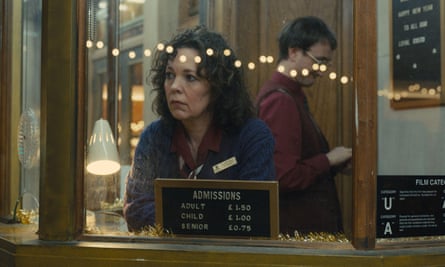
Tanya Moodie, who plays Stephen’s mother, Delia, says that if you were Black, the 80s were a time when “you either had friends who genuinely liked and respected you as a person, or friends who tolerated you and eventually would say something demeaning and undermining, and then you’d know where you stood. I just thought that as long as I’m with someone who’s nice, that’s enough.
“I’m 50 now, and I’ve lived my whole life in the body of a Black woman. But it was only three years ago I learned what anti-racism was and what it meant.”
A key reckoning in the film comes when Stephen is treated with contempt by a regular cinema customer. Little is explicit, but a bag of chips is eaten with unusual aggression, and a lot of dribble. Worse is the blind-eye turned by the staff, keen to defuse the situation. Afterwards, Stephen scolds Hilary for her complicity.

Speaking out is still hard, says Moodie. “Who wants to be that guy? It’s very difficult to call things out. I find it scary – unless someone is racist to my face, in which case I just think they’re dicks.”
The day after they shot the chips scene, says Ward, he went to a bar in Margate. Another young Black man came in, dressed in a suit, fresh from the new Tracey Emin opening. “This white guy was like: ‘Where have you been? To court?’” Colman gasps. “Yeah!” says Ward. “And I started laughing. It’s so subconscious, even to me as a Black man. It’s easier to laugh than to pull someone up on it. Or to not realise what’s actually going on.
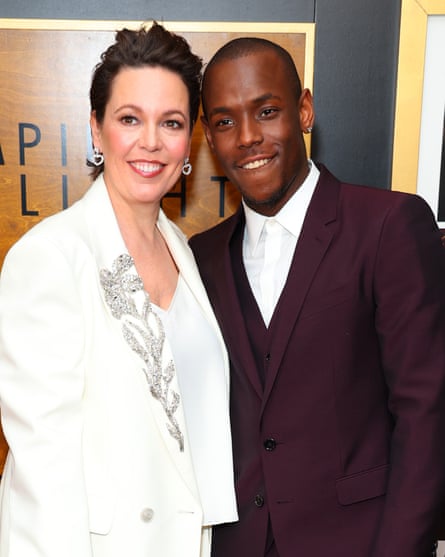
“The Black guy said to me: ‘Bro, don’t laugh. It’s not funny.’ And I was like: ‘Fucking hell, we literally just filmed that scene and I’ve gone and done the same thing.’”
Colman considers. It wasn’t just her younger self who didn’t stand up to bullies, she says. It was almost everyone. “You didn’t say anything, or you’d watch, say, an older man being revolting to a young woman. And you wouldn’t go: ‘No’.”
She does now, and not just in her dreams. “It’s important to not allow that to slip. To actually always go: that’s not OK.” Has she an example? “Yes. A cab driver example. When they might say: ‘Some of my best friends are black, but … ’ And you’re like: ugh, Jesus. Am I willing to have this conversation? There were times when I would have maybe just ignored it. But now I go: ‘You know, that’s not OK. By saying that you are exhibiting racism.’ ‘Ah, no, no, no.’ ‘Yes, you are.’
“It’s important.”
She and Ward smile at each other and, for a second, they look like lovers again.
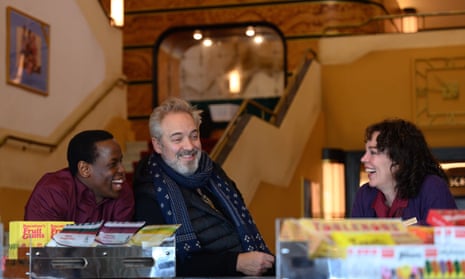
Comments (…)
Sign in or create your Guardian account to join the discussion